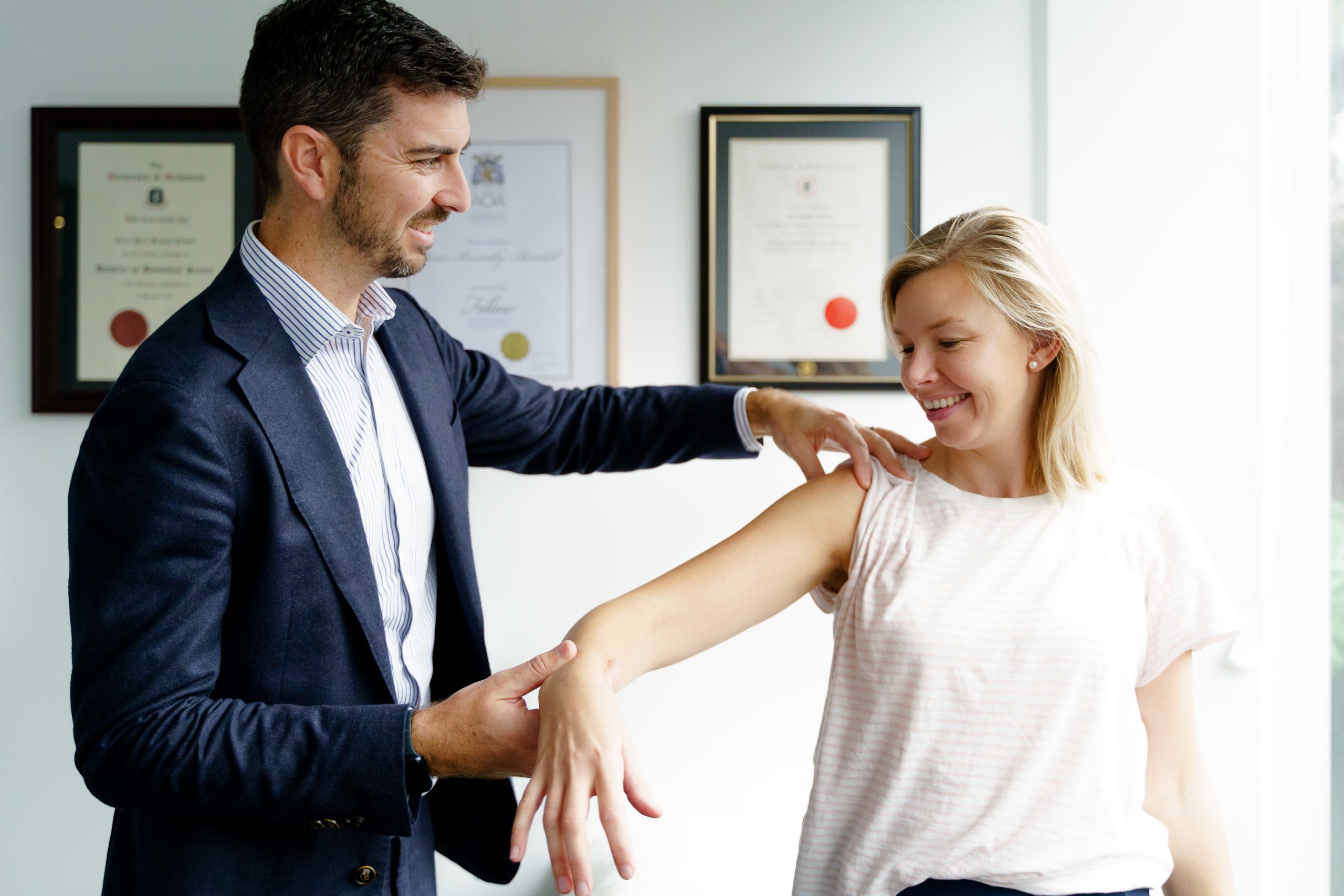Frozen Shoulder
Adhesive Capsulitis
Frozen shoulder, medically known as adhesive capsulitis, is a painful condition characterized by stiffening and loss of motion in the shoulder joint. It typically affects individuals aged 40–60, often after a period of immobilization or injury

Causes of Frozen Shoulder
- Post‑Injury Immobilization
- After an injury (e.g., fractures or rotator cuff strains), the shoulder may be immobilized for extended periods. This inactivity encourages scar tissue formation within the capsule, leading to stiffness
- Underlying Medical Conditions
- People with diabetes, thyroid disorders, Parkinson’s disease, or heart disease are at higher risk. These conditions contribute to capsule fibrosis and shoulder pain
- Age & Gender Factors
- Most common between ages 40–60, often affecting women more than men
- Post‑Surgical Immobility
- Even after minimally invasive procedures, failure to move the shoulder early can result in frozen shoulder due to capsule tightness
- Inflammation & Autoimmune Responses
- Inflammatory processes within the shoulder capsule, sometimes related to autoimmune activity, can trigger or worsen the condition.

Frozen shoulder symptoms
There are three phases:
- The joint begins to tighten and shoulder aching gradually increases.
- Sleeping on the affected shoulder induces pain.
- Reduced shoulder movement capacities and greater stiffness
- Difficulty completing everyday activities
- The abilities of shoulder muscles may continue to decrease due to lack of use.
- Mobility progressively increases.
- Gradual decrease in pain
Frozen shoulder treatments
As early intervention can prevent complex, long-term conditions, speak to Dr Oscar Brumby-Rendell as soon as possible if you are experiencing any of the addressed symptoms.
Dr Brumby-Rendell advises that you regularly move your shoulder, even if small pendulum motions are all you can manage.
Treatment options include:
- Anti-inflammatory medication which aims to lessen swelling and pain
- Exercises to stretch the shoulder
- Application of heat
- Stimulating nerves and muscles via electrical means
- Cortisone injections
- Surgery (should all other treatments be ineffective) - keyhole surgical techniques may be used to perform an arthroscopic capsular release.
- If surgery is required, a tailored rehabilitation program will be provided by Dr Brumby-Rendell.
In most frozen shoulder cases, the issues will correct themselves, either independently or in conjunction with physiotherapy, within 1 to 3 years.
How Dr Oscar Brumby‑Rendell Can Help
Comprehensive Frozen Shoulder Care with Dr Oscar Brumby‑Rendell:
From Diagnosis to Full Recovery
Dr Oscar Brumby‑Rendell offers a comprehensive and patient-focused approach to diagnosing and treating frozen shoulder (adhesive capsulitis). As a specialist in shoulder and upper limb surgery, he brings years of experience in managing this complex condition.

Initial treatment often includes:
-
Anti-inflammatory medication
-
Heat therapy
-
Gentle stretching
-
Neurostimulation
- These methods aim to reduce pain and prevent further stiffness in the early stages.
Under Dr Brumby‑Rendell’s care, patients receive guided rehabilitation, including supervised pendulum and mobility exercises that are essential for safe and gradual recovery.
For more persistent cases, he may recommend interventional treatments such as:
-
Cortisone injections
-
Image-guided hydrodilatation
- under ultrasound or CT guidance the shoulder joint is filled with local anaesthetic and anti inflammatory steroid to distend the joint under pressure.
If symptoms do not improve with non-surgical care, Dr Brumby‑Rendell can perform arthroscopic capsular release—a minimally invasive keyhole surgery that loosens the tight joint capsule and significantly accelerates recovery.
Following surgery, he provides a tailored rehabilitation plan designed to restore shoulder strength and support a full return to daily function.
Ready to learn more?
Learn more about shoulder impairment like Shoulder Impignement by Dr Oscar Brumby-Rendell.
Once you have a referral…
Book your consultation here.
